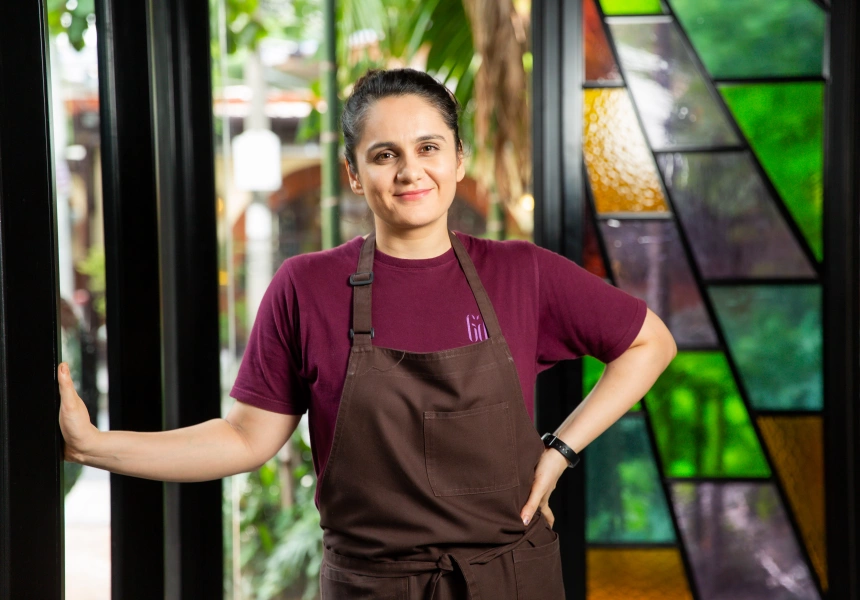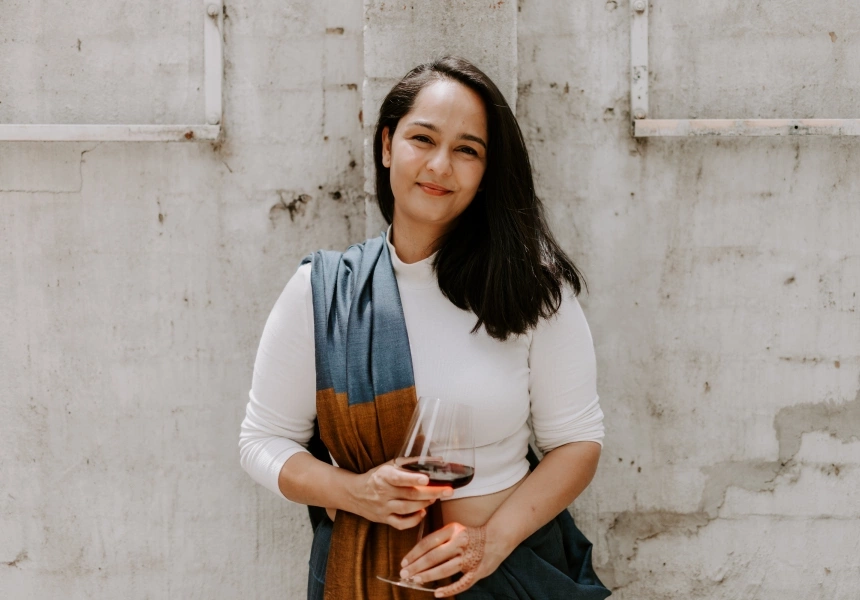Garima Arora made history last year when she became the first female Indian chef to have a restaurant receive two Michelin stars. Gaa, her Indian fine diner situated in a traditional Thai house in Bangkok, is currently ranked number 32 on Asia’s 50 Best Restaurants list.
Gaa is known for combining Indian culinary techniques with Thai ingredients. And, soon, Arora will bring Gaa to Melbourne as part of this year’s Melbourne Food & Wine Festival. The chef will be taking up a residency at Crown Melbourne, serving an eight-course tasting menu from Wednesday March 15 to Sunday March 25.
Ahead of her visit, Arora took time to talk over the phone with Melbourne chef Helly Raichura, whose Carlton North restaurant, Enter via Laundry, is known for profiling under-represented cuisines from across India.
Get the best of Broadsheet first with Today – our free newsletter. Our expert editors curate the day’s most interesting and useful stories – new restaurants, must-see exhibitions, fashion trends, travel spots and more.
SIGN UPWhile both chefs are originally from India, neither has worked there professionally, instead presenting Indian food at fine diners abroad. Here they discuss changing perceptions of Indian food outside the country, thoughts on menu development and what it’s like to raise kids while running a restaurant.
Cooking Indian food with foreign produce
Raichura: You have a restaurant in Bangkok, and though there are some similarities to the produce we find back home [in India], there’s a lot of great native produce in Thailand. How does this influence your cuisine?
Arora: That is kind of our DNA at this point: we take Indian techniques and then apply them to locally found produce. I always say that if Gaa wasn’t in Bangkok, it would probably be the same in spirit. But of course, the produce on the menu would not be anything like it is today.
Take durian, for example. We take a chunk of the durian and cook it in the tandoor, and try to showcase what’s possible with vegetarian cooking. That’s a classic example of how we play around with produce available in Thailand.
Raichura: Are there any Australian ingredients you’re excited about using here in Melbourne?
Arora: Looking at all the produce that is available, I really wish we would have come a couple of weeks in advance to try it all. We are literally going to get in two days before we open, and there are things I haven’t heard of in my life – all these berries and fresh herbs.
I don’t know how much we’ll be able to incorporate in our menu, but we’ll definitely try. But I think this is not going to be our last time cooking in Australia. Once we’ve tried all these things, we’re probably going come back with a more Australian-inspired menu.
Developing a menu
Raichura: What is your method of creating a menu?
Arora: We have a very specific way of approaching our research and development. We look at flavours, we look at techniques and we look at culture. A menu or a dish has to do justice to one of these three themes. Is it trying to tell the story of flavours? Is it trying to tell the story of a technique? Or it is telling you a cultural story?
On changing perceptions of Indian food
Raichura: I’ve been in the industry for about six years now. I think when I started cooking regional Indian, I wasn’t sure if I could even get those regionally focused dishes in Melbourne or in Australia. Some restaurants specialised in it, but not as many as do now.
But now I can see a lot of Melburnians understand [regional variations]. There are even more restaurants specialising and classifying where their food is from, rather than having the good old naan and curry. So there is more understanding, for sure. There is more appreciation of the technique that goes into the food, and overall there is more curiosity and interest. At least, that’s my experience.
Arora: For the longest time what we have exported in the name of Indian food is curries and naan – but let’s be honest, that’s not what Indian food is. I think there is a newly sparked interest in discovering the real food of India. And that’s what people are picking up within the country as well.
Within India I see chefs champion their regional cuisine, but they’re also now taking these regional experiences with them internationally. And I see more and more people from outside the country now appreciate this. I mean, sure, curries and naans are great, but that’s not really our food.
On motherhood
Raichura: Congratulations! You just had a baby.
Arora: Not just – he’s nine months now!
Raichura: How is it?
Arora: You tell me! You’ve done it longer than I have.
Raichura: I remember I was breastfeeding, and I was doing an online class for my liquor licence at the same time and trying to calm her. That’s one memory. And, I mean, I’ve got a very supportive husband – that’s the reason why I can stay out of the house at odd hours and still be okay.
Arora: So you know how it is – it’s very tricky. I never appreciated until I actually became a mum that we have the worst bargain here. You know, when you’re at work, you’re thinking about your kid, and when you’re with your kid, you’re thinking about your to-do list from work. I always feel that I’m not doing justice to either.
You can talk all about equality, but it’s never the same for women and working women. It’s two parts of our being, which are of course both important to us. Both come naturally to us. It’s so difficult to choose, but you always have to choose one or the other – at least in the moment. That's just the reality of it.
But you’re right. I think it’s people around you that make or break it for you. You know, they say it takes a village to raise a kid. In my case, the village is built into my restaurant. So I take him with me to Gaa every day.
I have a staff of 40 people, so he’s with one person for 15 minutes and, before you know it, it’s time for service and time for him to go to bed. We as business owners can afford that and can manage that. I always wonder how women who work nine to five or do other jobs manage – I think it’s the most unfair ask of a mother to spend time away from their child.
On Melbourne
Raichura: What will you get up to while you’re in Melbourne?
Arora: I have only one agenda, and that’s to try and eat as much as I can.


